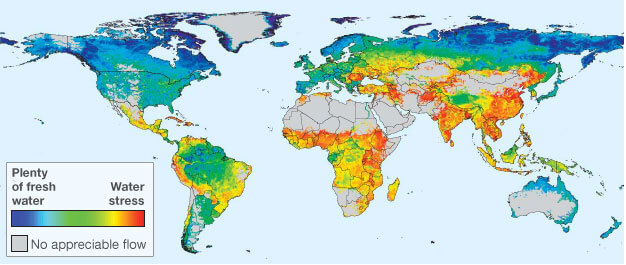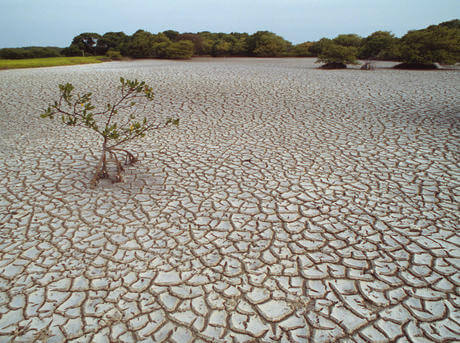Only what is rare is valuable!.
Categories: Conservation, El Medio Ambiente, Environment, Planet Earth, Recursos Naturales
The Greek Philosopher Plato argued it is scarcity that gives a resource its valuable, and water, which is the best of all things.. is also the cheapest. That water was cheapest, for a logical master such as Plato, have meant it was a plentiful resource – a resource for which there was no competition. Read this article in Spanish.
But while the connection between economy and water remains as strong as in Plato’s time, abundant water resources are a thing of the past.
The absolute majority of the water on our planet is salty and cannot be used by humans for much more than fishing and carrying our ships. As odd as it may seem on a planet whose surface is three quarters covered by water, there is only a fraction that is fresh enough for terrestrial life.
The total amount of liquid freshwater that is usable for humans and ecosystems would actually fit in a cube with each side measuring roughly 60 kilometers ( just short of the distance of the Bay Area body of water in San Francisco or roughly the size of Lake Managua). This is all the fresh water we have to quench our thirst, grow our food, spin our turbines and manufacture our goods. And we must share it wisely with our fellow species in order to sustain our ecosystems on which our well being depends.
The reason we have all been able to survive on such a tiny volume of fresh water is that it forms part of a renewable cycle, allowing it to be used over and over again. That freshwater is a finite resource has always been overlooked, leading to over-extraction and weak incentives for efficient water use. Inefficient use of the best of all things would hardly qualify as good housekeeping or wise economic policy even if there were no scarcity.
Human use of freshwater has increased dramatically since Plato’s days and, according to the OECD (The Organization for Economic Co-operation and Development), demand will continue to grow for the foreseeable future. The technological advances advancements and incentives for managing demand are currently not sufficient, leading to a world that is projected to use 55 percent more water in 2050 than in 2000.
As a result, 45 percent of the global population and over 60 percent of people in the rapidly developing BRIICS ( Brazil, Russia, India, Indonesia, China, South Africa) economies will be living under severe water stress in 2050.
Historically agriculture production has been the main user of freshwater, accounting for two thirds of total withdrawals. But demand from other part of economies and society is rapidly increasing. Energy is one sector hungry for the use of freshwater.
The global energy demand is expected to increase by one-third from 2011 to 2035. It is well known that the production and extraction of primary good such as minerals, food and fuel requires vast amount of water, but so does the conversion of raw material into consumer goods. In the BRIICS the manufacturing industrie’s appetite for water is expected to increase by over 700% to 2050, equaling 11 times the annual flow of the river Nile.
We clearly need to start managing the demand for water more wisely. Most governments have a standard response to this by simply increasing its price, but with water its not that simple. First, water for basic human needs is recognized as a human right. This does not necessarily mean it must be free, but states have an obligation to ensure it is affordable to all. Water its also different from other important natural resources.
First, water moves. The liquid freshwater on our planet is in constant movement: it falls, and flows and seeps. This makes the ownership of water difficult. In international conferences panels discuss about a right to access rather than a property right to water. This in turn means the right can be limited, in volume, in time or in the type of usage.
Secondly, water revolves. When we use water it does not disappear. Instead we change its quality or its phase,. by converting it to vapour. In many cases, nature cleans and condenses the water back to its original state, albeit in another location and at another time.
Thirdly, water varies. Freshwater is unevenly distributed across the world not to mention the variations in rainfall depending on the region, leading to a vast fluctuation in supply in addition to a variable demand. Given these changes market prices would be very volatile.
Fourthly, water is local. Liquid water is uncompressible, heavy and often needed in large volumes. With high transportation costs, the difference in price between the source and use would have to be high to allow for its conveyance. Water is largely, and will continue to be a local resource.
It pays to do the right thing. It makes good business sense to manage water wisely. But not enough is happening. We need stronger incentives to drive the message home about being more efficient, conserving and protecting this precious resource we still take for granted.




Indeed. Here is an example of how to get some water in Africa.
http://wp.me/p45cVP-8F
Hey Spiderbass,
Thanks for the link, Maybe governments can listen to little guys like you and me and learn something. Cheers!
German.
Water does need to be handled more wisely because it is currently not being handled correctly at all, and despite it being a renewable source because of its cyclical nature, does not mean that we won’t run into a water crisis at some point. As you say, the fresh water that we need to survive is only a fraction of the amount of water that is on the globe, and with it being a human right, it must managed correctly so that everyone has access to it.
Different countries may want to handle it differently, but increasing the price of water as it becomes more valuable, does not create a solution. Instead it can create issues with water being a human right, considering not everyone will be able to afford increasing prices. I personally do not think that water should be bought or paid for, but unfortunately the world revolves around commodities and resources which always have a price attached.
Dear Chantelle,
I love your very strong opinion about this post,. Its the kind of statements politicians need to get serious about. If they could only heed the ideas and mentality of new generations like yours they might have a chance of winning elections without lying.
Well done.
Best,
G.
This is a truly serious problem which I think we should all be aware of so thank you for writing this! It’s a huge worry that we’ll run out of water and as we do I can only worry that there will be major world conflicts and this will likely destabilize the entire world. If the poorer countries are the ones who have water – the richer ones will go in and take it – just look at what’s happened with oil.
Louisa you are absolutely right,. its a worry to us all about the water issue. If we are killing each other for oil, imagine what we’ll do for water?. Thanks so much for your comment.
G.